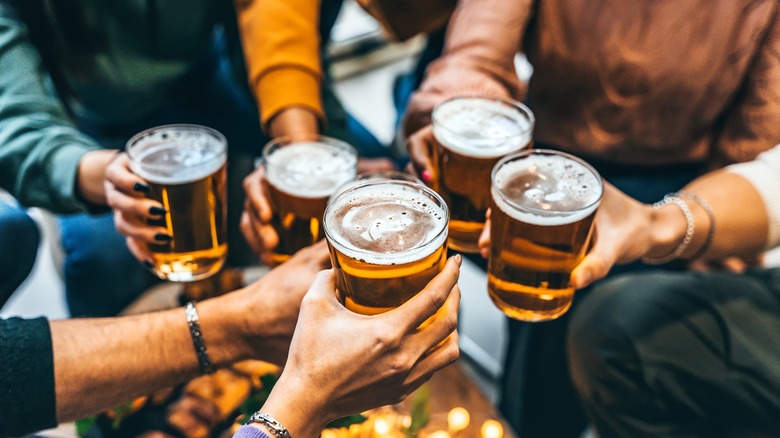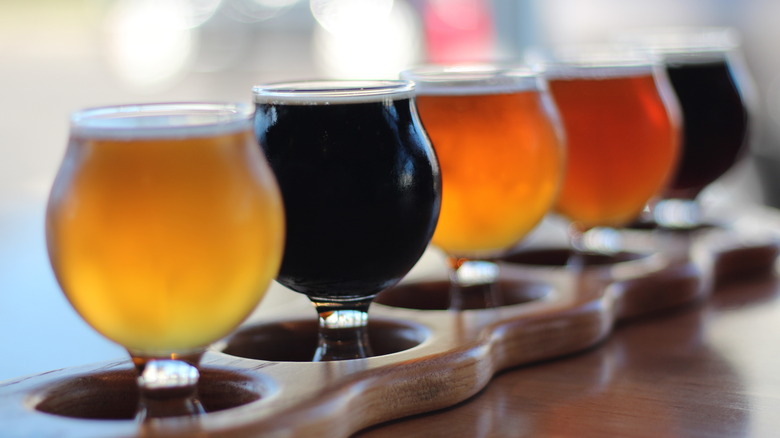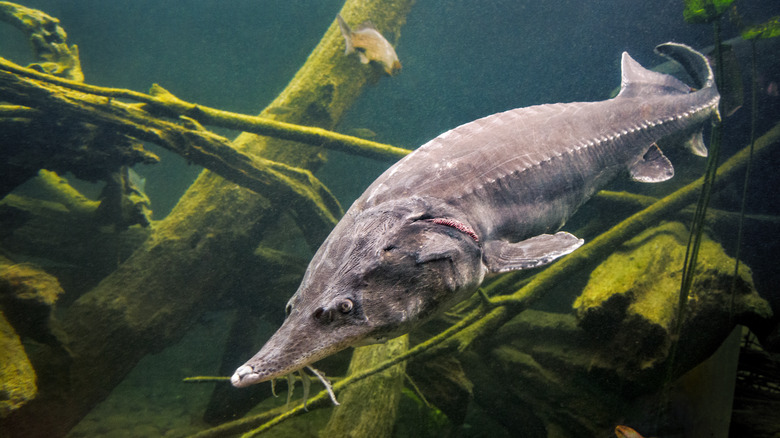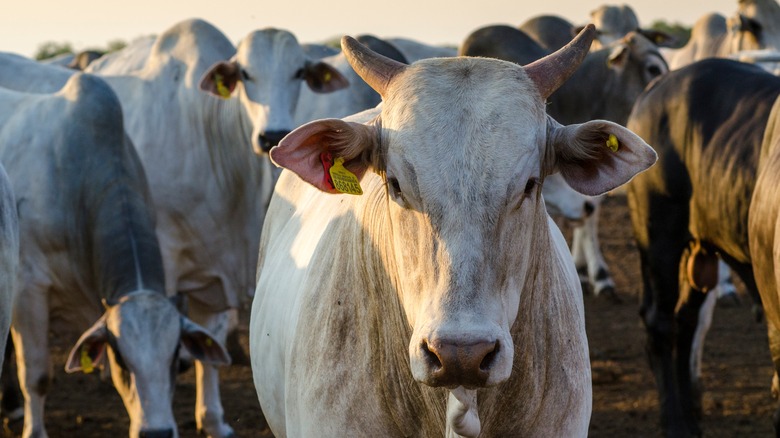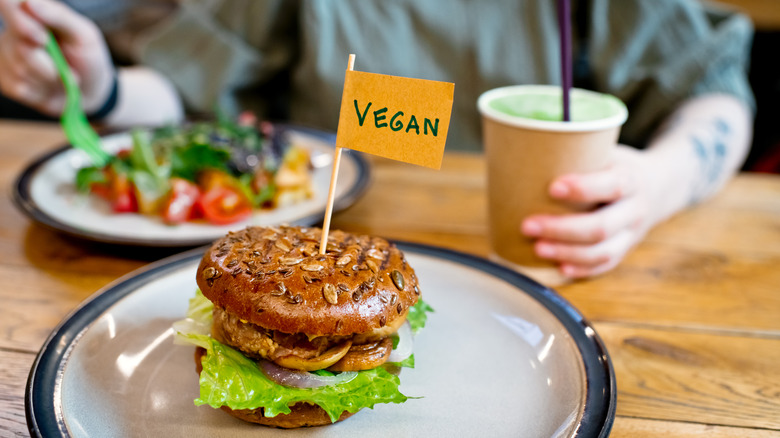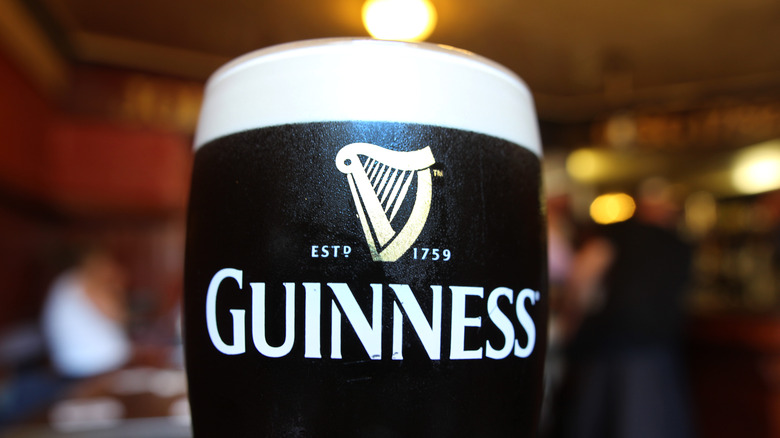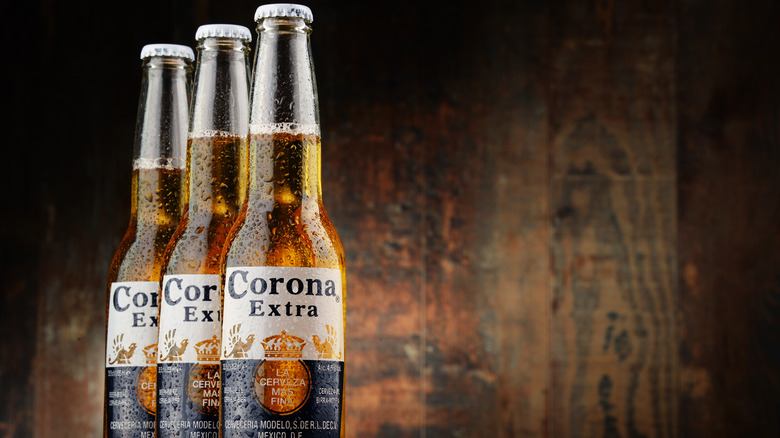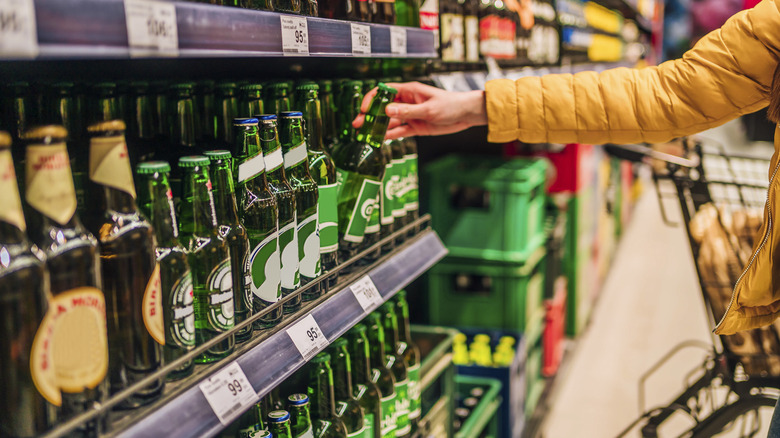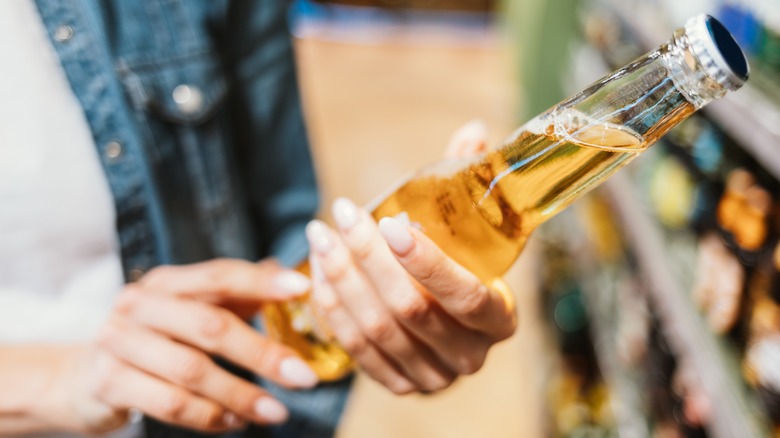Everything You Need To Know About Vegan Beers
Behind water and tea, beer is the third most consumed beverage in the world, generating around $500 to $600 billion in sales each year (per Statista). The U.S. alone contributes $115 billion to that number (per Brewers Association), with the average adult over the age of 21 consuming about 28.2 gallons per year. Whether you're in East Asia or Southern Europe, North America or West Africa, the preferred beverage after a long day of work is more likely to be beer than anything else.
Humans have been fermenting grain to create this alcoholic beverage since Paleolithic times, and like us, it has evolved greatly over the past 15,000 years, shaped by consumer preferences, technological inventions, and ingredient experimentation. On the surface, beer and its creation seem vegan-friendly. The standard recipe calls for only four simple ingredients — barley, water, hops, and yeast. The barley is soaked and heated to release naturally occurring sugars, then boiled with hops. Lastly, yeast is added to ferment the sugar into alcohol. None of these ingredients or steps pose red flags to vegans, but over the centuries, some traditions have emerged that involve various animal products. Keep reading to find out how to avoid non-vegan-friendly beers and learn why some beers aren't vegan in the first place.
There is a wide range of animal products in some beer
None of the four main ingredients in beer are derived from animals, so you might be wondering where the non-vegan part comes in. Over the years, brewers have added certain ingredients to enhance the flavor, appearance, and consistency of their brews. Honey is a common option. Rather than being used primarily for sweetness, it raises the alcohol content by providing more sugar for the yeast to ferment. A less common additive is carmine, the dye derived from cochineal beetles that was responsible for the trademark crimson hue of Campari until the brand switched to artificial colorants in 2006. If you see a beer that has a reddish-pink color, it may well have insects to thank.
To add sweetness and a thicker, smoother mouthfeel to beer, brewers often add lactose, a type of sugar derived from milk. It is often found in stout beers, especially milk stouts, which tend to be creamier and sweeter than other types of beer. It's a popular addition since yeast cannot ferment it. Another ingredient you might find is oysters. These shellfish have been used as flavor enhancers (yes, enhancers) since the 19th century, and some brewers and beer drinkers still swear by the hints of sweetness and brininess they lend to a beverage. It isn't a niche trend either. Even Bud Light Clamato Chelada is made, as its name suggests, with clams.
Animal products are a traditional part of the brewing process
Even if there are no animal products in the beer itself, there may still be animal products used in the brewing process. Most beer is filtered to remove yeast particles that make it cloudy. It's an aesthetic choice, but most of us have grown accustomed to beers that are transparent rather than murky, so removing all the yeast particles (called "finings") is a commercial concern at this point. There are many ways to fine beer, but since the 19th century, one of the most popular has been with isinglass, a deceptively pleasant-sounding substance made from the swim bladders of freshwater fish. As isinglass sinks through the liquid, the suspended particles of yeast glom onto it in a process called flocculation, descending to the bottom in a gelatinous mass that can easily be separated from the clarified beer. In 2003, the European Parliament proposed a law that would compel beer makers to clearly label the use of isinglass on their products, but it failed to pass after intense lobbying from manufacturers.
Other fining agents include gelatin, which is made by boiling mammal bones, skin, and tissue, and chitosan, which is derived from the exoskeletons of shellfish, including oysters.
Certain fining agents have been illegal for decades
The move toward making beer vegan is largely a 21st-century phenomenon, but some animal ingredients were even a bridge too far by the comparatively laissez-faire attitude of the 20th century. One of the traditional fining agents used in beer and winemaking was ox blood. Like isinglass and gelatin, it attracted the yeast, creating a heavier substance that sank to the bottom and could easily be separated from the clarified liquid.
In 1997, however, the U.S. and European Union banned ox blood from beer and winemaking. It wasn't because the idea of drinking trace amounts of cow's blood was a little gruesome even for meat-eaters, but because of the crisis surrounding bovine spongiform encephalopathy, more commonly known as mad cow disease. Following several deaths in the U.K. in the mid-'90s, panic about the disease spread, and regulators clamped down on products containing cow meat. The ban on ox blood made headlines in 1999 when French authorities seized more than 18,000 gallons of wine over reports that they might have been clarified with the illegal substance.
There is no legal definition of what vegan is
It's all well and good to push for food and beverage manufacturers to make their products vegan, but it's much more easily said than done. The trouble is that there is no agreed-upon definition of what "vegan" actually means. On a broad level, it means that no animal or animal-derived ingredients are used in the product or in the process of making the product. But beyond this general definition, there are plenty of gray areas. For example, some vegans do not eat honey or use anything made with beeswax because both are derived from bees, but others do. It ultimately boils down to personal ethics and one's view of the bee industry, neither of which lend themselves to an objective definition.
The problem with having such little clarity about the definition of veganism is that it makes regulation tricky. There is no legal definition of the word in the U.S., EU, or U.K., which allows manufacturers to call their products vegan without oversight. Many vegan accreditation schemes around the world lend their stamps of approval to certain products, but each of these organizations follows its own rules and processes. Assessing whether a particular beer fits within this dietary category is therefore more complicated than it might seem on the surface, even in rare instances where the label claims the product is vegan-friendly.
Guinness went vegan in 2016
Guinness is one of the most popular beers in the world. Sold in 120 countries, it's one of the most iconic beverage brands and is closely associated with its Irish heritage. According to Gitnux, 13 million pints of the beloved stout are sold every year on St. Patrick's Day alone, and year-round, one out of every 10 beers sold in London is a Guinness (via The Drinks Business). Given the scope of the brand's influence, it made waves in 2015 when it announced that, after 256 years, its beer would be vegan by the end of 2016.
As is the case with most non-vegan beers, the animal products used in Guinness were not found in the beer itself but in the fining process. The company had been using isinglass to remove the yeast from their beers since the 1800s, saving thousands of pounds per year due to how effective it was at filtering out unwanted particles. The company had insisted as late as January 2015 that no other option was possible, but by the end of the year, it had changed its tune and was developing an alternative, vegan-friendly system.
Many beers were already vegan
For manufacturers that have always stuck to the basic four ingredients of beer making and either do not fine their beers or use other methods during the fining process, labeling their products as vegan has never been an issue. Corona, for example, has always been vegan-friendly, and Heineken and the original Budweiser are also safe for vegans, though they don't use it as a marketing strategy.
While some beers are incidentally vegan due to alternate manufacturing processes and minimal ingredients, others are vegan because brewers intentionally skip the filtering process. You might think that transparent beer would be preferable from a purely aesthetic standpoint, but many beer connoisseurs believe that removing the finings leads to lower-quality and less flavorful results. For one thing, there is no way to remove the yeast particles without also removing some of the taste. For another, certain brewing methods result in a more hazy appearance than others. Adding hops to the casks creates a more powerful, citrusy flavor and usually results in more haze, while much of the flavor from wheat beers comes from protein particles that would be filtered out if they were fined. As a consequence, there are plenty of beers that are vegan for perceived quality reasons rather than dietary or animal rights reasons.
Millennials popularized vegan beer
Millennials have been catching flack for just about everything since the first part of the cohort hit their early 20s, but we have them to thank for the surge in beers that appeal to various dietary preferences. According to a 2018 report from GlobalData, the millennial demand for health-conscious foods and beverages led to brands introducing low-calorie, gluten-free, and vegan products like never before (via Beverage Daily). Rather than producing catch-all products that were low in calories, alcohol, and flavor, brands started making products that were palatable and specific to each dietary requirement.
At long last, low-calorie beers didn't automatically entail low alcohol or nonexistent flavor, and gluten-free beers no longer meant light and tasteless beers. Guinness went vegan around this time, proving just how firmly the trend had taken a foothold. Although many beers were already vegan, the influence of health-conscious Millennials led some manufacturers to either switch their fining agents or disclose whether their products were vegan-friendly.
Brewers are using new fining agents
The main bottleneck for brands who are attempting to make their beer vegan is fining. Changing the manufacturing process is a long and laborious task, even once a new method is chosen, which is why Guinness was insisting all the way up until 2015 that going vegan simply wasn't an option for them. Luckily, modern technology has made the transition easier. Centrifuges are the main method. Instead of using ingredients that will attract the yeast particles, brewers use physics. The liquid is put into a round chamber and spun at high speed, forcing the heavy particles to the outside of the chamber and the lighter liquid to the center. The clear liquid is then drained, leaving the yeast and other particles behind.
Other options are much less high-tech. For example, some breweries, including Sierra Nevada Brewing Co., use a type of seaweed called Irish moss that acts similarly to gelatin and isinglass, while others use bentonite clay and a type of sand made of fossilized algae. In most cases, the fining process has multiple steps, including the natural settling of particles through gravity, as well as centrifuges and a natural fining agent like Irish moss.
You won't be able to taste a difference
If you've decided against buying vegan beer because you've already been burned by gluten-free or low-calorie options, don't worry. Unlike other products geared towards certain dietary preferences, vegan beer is indistinguishable from beer that uses animal products. The reason gluten-free beer has such a bad reputation is because the taste of beer is dominated by the flavor of barley, which is gluten-based. Replace this with a gluten-free grain like millet and you get a different taste entirely. Low-calorie beer is similarly unappealing because reducing the calorie count means removing or diluting the ingredients that provide flavor.
Vegan beer has none of these issues. In fact, if you're thinking about switching to it, you might not even have to go to the grocery store because the beer you favor might already be vegan. Crack open a Corona, a Miller Lite, a Budweiser, or a Stella Artois and you'll be drinking a vegan beverage. And even if you do venture into new territory and try a beer that is specifically marketed as vegan, you can expect to find the same range in quality as conventional beer.
Not all vegan beers are labeled vegan
Many beers are already vegan, but you won't see the brands using this as a major selling point. The reason might stem from the desire to keep their products broadly appealing. A vegan label probably wouldn't resonate with the people who drink Bud Lite while standing over the barbecue on game night, even if others would appreciate clarity around whether the beverage is suitable for their vegan diet.
Another reason brands don't advertise their vegan credentials is purely practical. They simply don't bother applying for certification because the certification process is lengthy and varies between certifying bodies. In general, it involves a review of the ingredients and complete manufacturing process. Given the multi-national scope of many beverage companies and the fact that many vegan certification schemes are national or regional, the task would be complicated and might even result in different packaging requirements across distributors. For these reasons and the potential lack of consumer demand for brands with wide recognition and a pre-existing customer base, there is little incentive to complicate matters by applying for the little "v" label.
Some animal products will likely be labeled
You might not see a "certified vegan" label on all vegan beers or be able to tell when a beer includes animal products in its ingredients or manufacturing process, but there is one animal-derived product that is likely to appear on packaging: lactose. This sugar derived from milk can't be fermented by yeast the way other types of sugar are, and brewers add it to beer for sweetness and a rich mouthfeel. According to a 2017 study published in The Lancet, about 68% of the global population suffers from lactose malabsorption, the inability to fully digest the sugar. Symptoms of the condition include bloating, diarrhea, and stomach cramps, and are worth avoiding even when mild.
The severity of lactose intolerance varies, and many people who struggle to drink a glass of whole milk without feeling sick most likely won't have issues drinking a pint of beer with lactose due to the relatively low concentration. For those with severe lactose intolerance, the ingredient should be avoided no matter how small the dose is. For this reason, many manufacturers of alcoholic beverages elect to state the presence of lactose on their packaging. It is important to note that under the regulations of the Alcohol and Tobacco Tax and Trade Bureau (TTB), there is no requirement to disclose the presence of allergens, including lactose. If you are severely lactose intolerant, you cannot be sure that a beer is lactose-free even without a warning on the label.
Just because it's vegan doesn't mean it's healthier
Veganism is often associated with health food as a whole and illustrated by a bounty of colorful, vitamin-rich fruits and vegetables. When it comes to beer, however, "healthy" just doesn't apply. According to a comprehensive meta-analysis published on JAMA Network Open in 2023 that examined 107 studies, there is no amount of alcohol of any type that can contribute positively to a person's health. At best, drinking a low to moderate amount of alcohol has no effect. At worst, it can lead to an early death.
If you're considering calorie content, vegan beer has just as broad a range as non-vegan beer. A light beer can be lower than 100 calories per 12 ounces, while IPAs and stouts can tip over 250 calories. One of the lowest-calorie beers, Budweiser Select 55 (which has only 55 calories), and one of the highest-calorie beers, Sierra Nevada's Bigfoot (318 calories) are both vegan. If you're on the hunt for a health-conscious beer, you'll need to use another metric than whether or not it's vegan.
What to look for when buying vegan beer
The main issue that arises when you set out to find a vegan beer is that, by a quirk of regulatory history, alcoholic beverages are not required to disclose their ingredients or nutrition profiles. Grab a box of strawberries or a can of soda and you will, without fail, see exactly what ingredients they contain and how many calories, carbohydrates, and grams of protein they provide. Even bottled water has nutrition labels. Unlike food and zero-proof beverages, however, alcohol is not regulated by the F.D.A., meaning that it lives under different rules. When Prohibition ended in the 1930s, the U.S. government gave regulatory power to a different authority, which is now the Alcohol and Tobacco Tax and Trade Bureau. The TTB still doesn't require manufacturers to list allergens on their labels, let alone ingredients, nutrition, or aptitude for specific diets.
As veganism has spread, however, more resources have become available. The website Barnivore, for example, provides a directory of tens of thousands of alcoholic beverages that have been verified as vegan or non-vegan by direct communication with the manufacturers. Many breweries also detail their brewing process and ingredients on their websites, so you may be able to rule out a beverage with a quick internet search. If neither of these options works, you can always try contacting the brewery directly.
